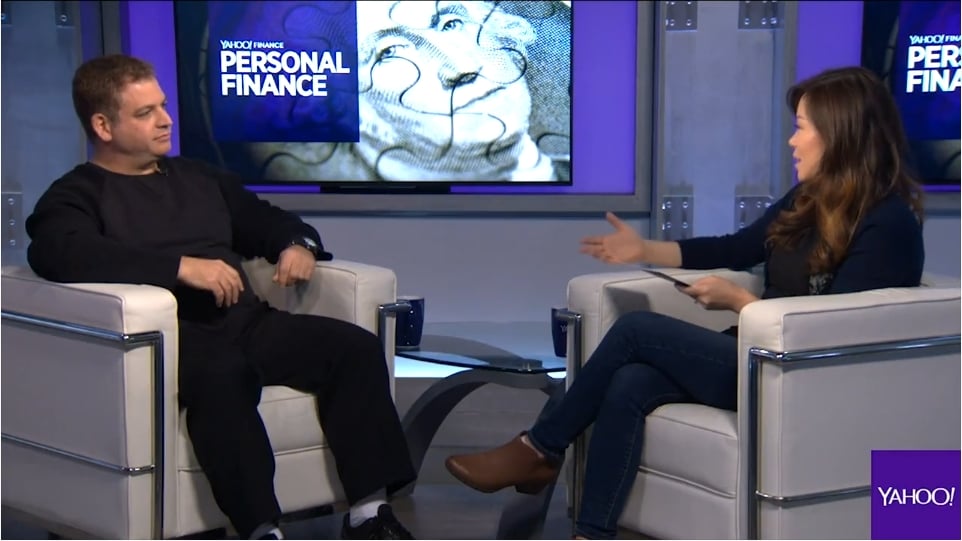Your Next Greenlight-Ready Story Starts Here
See for yourself how Story Studio Lab PRO Comprehensive Breakdown, Report & Coverage delivers rapid, professional insights to elevate your manuscript or screenplay to industry standards—quickly and efficiently:
Transform your manuscript or screenplay into a polished, greenlight-ready project with the professional insights of Studio Standard Coverage.
(Currently We Are Only Accepting Screenplays)
Questions? Contact us at: [email protected]
Story Studio Lab PRO Comprehensive Breakdown, Report & Coverage is designed to give writers the same professional insights used by film studios, producers, agents and managers.
As a writer, you don’t just want feedback—you want insights that matter. Studio Standard Coverage, powered by Story Studio Lab PRO, gives you the same tools professionals use to break down your screenplay into clear, actionable insights that show you exactly what’s working, what’s not, and how to make your story stronger.
Where traditional coverage can take days or weeks, Studio Standard Coverage delivers a thorough analysis of your story’s plots, characters, arcs, structure, comps, and themes—in as little as 2 hours.
No more vague notes. No more guesswork. This is objective, professional-level feedback that helps you confidently revise, pitch, and move your story forward. Traditional coverage points out what’s wrong with a story—Story Studio Lab PRO Comprehensive Breakdown, Report & Coverage shows you what’s possible.

What Makes Studio Standard Coverage Essential?
-
STUDIO-LEVEL INSIGHTS
Get the same professional analysis used by film studios, producers, and agents to evaluate screenplays and manuscripts with clarity.
-
CHARACTER & PLOT INSIGHTS
Uncover key insights into character arcs, motivations, and plot structures, giving you the tools to refine your story for greater emotional impact.
-
ACTIONABLE FEEDBACK
No more vague notes or subjective opinions, rather get objective, actionable insights to help you confidently revise, pitch, and move your material forward.
-
OBJECTIVE STORY SUMMARIES
Receive clear, concise breakdowns of your story’s plot, characters, themes, and structure, helping you spot strengths and weaknesses at a glance.
-
MARKET & STORY POSITIONING
Gain insight into where your story fits in the market, helping you refine your narrative to better align with industry expectations and trends.
-
ALTERNATE STORY EXPLORATIONS
Explore new plot directions or alternate character decisions to uncover hidden opportunities and fresh ideas without endless rewrites.
See Your Story in a Whole New Way
Discover how Studio Standard Coverage breaks your story down into clear, actionable insights that highlight what’s working, what’s not, and what can be improved. This sample shows how our advanced analysis process delivers targeted feedback on plot, characters, and structure, giving you the tools to strengthen your story and elevate it to a professional standard.
In as little as two hours, you could have a detailed breakdown and comprehensive report of your screenplay—ready to guide your next steps (partial sample):
Title: Michael Clayton
Author/Writer(s): Tony Gilroy
Identified Genres: Drama, Thriller, Mystery
Tone: Dark, Gritty, Suspenseful, Tense
Big Top-Level Concept: A corporate "fixer" must expose a dangerous corporate cover-up while battling his own personal and professional demons.
Logline: When Michael Clayton, a morally compromised law firm "fixer", discovers his colleague has uncovered damaging evidence against a powerful chemical corporation, he must navigate a dangerous web of corporate corruption and personal survival before the truth is permanently silenced and he becomes collateral damage.
Basic Synopsis:
Michael Clayton is a "fixer" and "janitor" at the prestigious law firm of Kenner, Bach & Ledeen, tasked with handling the firm's most sensitive and delicate situations. Personally, Michael is struggling with financial troubles and a strained relationship with his troubled brother Timmy, who is battling addiction.
The central conflict arises from the actions of Karen Crowder, the Senior In-House Counsel for the agricultural/chemical company U/North, which is facing a high-stakes class-action lawsuit over its harmful weed killer product. Determined to resolve the lawsuit on U/North's terms, Karen engages in unethical and potentially illegal actions to cover up damaging evidence of the company's wrongdoing. As Michael becomes aware of the extent of U/North's misdeeds and the firm's complicity, he is drawn into the escalating conflict, forced to navigate the ethical dilemmas presented by the case while also dealing with his own personal obligations and burdens.
The story climaxes as Michael confronts Karen, threatening to expose the truth about U/North's actions unless she pays him a substantial sum of money. Realizing that Michael has the upper hand, Karen reluctantly agrees, but Michael ultimately decides not to accept the bribe, instead walking away and leaving the chaos in his wake. The resolution sees Michael shedding his role as the firm's "fixer" and taking a stand against the corrupting influence of corporate power, even at the cost of his own financial security.
Rating:
Guidelines for Scoring:
1-4: Below industry standards, significant work required.
5-6: Average, with some strengths but key weaknesses.
7-9: Strong compared to comps but with room for improvement.
10: Outstanding, on par with the best in the genre.
Screenplay Ratings and Final Recommendation
Overall Rating: 9/10
Explanation: The screenplay is engaging and well-crafted, showcasing strong character development and a gripping narrative that aligns closely with industry standards for thriller dramas. It effectively captures the tension and moral complexity seen in comparable films.
Concept (Originality and Hook): 8/10
Explanation: The concept is unique and compelling, exploring the themes of corporate corruption and personal redemption. It stands out in the market, drawing parallels to films like "The Constant Gardener" and "The Insider."
Execution of Concept: 9/10
Explanation: The screenplay expertly realizes its concept, maintaining a high level of tension and urgency throughout. The narrative flows smoothly, with well-placed plot twists that keep the audience engaged, comparable to "Erin Brockovich."
Plot (Structure and Pacing): 8/10
Explanation: The plot maintains a solid structure with effective pacing. It builds tension and complexity in Act II, leading to a satisfying climax that resonates with the audience, similar to "Michael Clayton."
Characters: 9/10
Explanation: The characters are well-developed and relatable, with Michael Clayton serving as a compelling protagonist who undergoes significant transformation. The supporting characters, particularly Karen Crowder and Arthur Edens, also exhibit depth and complexity.
Themes: 9/10
Explanation: The screenplay delves deeply into themes of corporate greed, moral compromise, and the quest for justice. It raises thought-provoking questions about ethics and integrity, aligning well with the thematic explorations of its genre.
Market Potential Score: 8/10
Explanation: The screenplay has strong commercial appeal, given the current market's interest in thrillers that tackle social issues. Its unique premise and character-driven narrative position it well within the genre.
Budget Estimation: Medium
Explanation: The screenplay requires a medium budget due to its settings, character-driven scenes, and potential for some visual effects, particularly in the climactic moments.
Final Recommendation: ✅ Recommend
Explanation: The screenplay is a strong contender for production, exhibiting high-quality writing and a compelling narrative that resonates with current trends in the genre. Its depth and execution make it an appealing choice for filmmakers seeking engaging, socially relevant stories.
VIEW THE ENTIRE REPORT:
What Studio Standard Coverage Delivers
Understand your story’s core genre and emotional tone, ensuring it resonates with the right readers and audiences.
Quickly create clear, engaging summaries that help you see your story’s essence and stay focused during revisions.
Get a detailed map of your story’s flow, making it easier to spot pacing issues, missing stakes, or structural gaps.
Analyze character arcs, motivations, and relationships to ensure your characters are consistent, compelling, and emotionally resonant.
Evaluate your story’s plot structure and pacing to ensure it hits the key narrative beats that keep readers engaged.
Automatically generate a complete list of characters, making it easy to track roles and relationships—helping you balance your narrative.
Explore alternate plot directions and what-if scenarios to uncover hidden opportunities and fresh creative ideas for your story.
-
Uncover fresh ideas without endless rewrites.
-
See alternate versions of key plot points or character decisions.
-
Identify hidden opportunities to strengthen your story.
-
Feel inspired to take your story in new directions.
-
Turn feedback into action with practical, forward-looking suggestions.
See Beyond Your Current Draft. See What's Possible.
Studio Standard Coverage goes beyond highlighting issues. It taps into SSL's Imagination Engine to generate alternate plot directions, what-if scenarios, and fresh creative takes—helping you rethink key moments and discover untapped potential in your narrative.
Our coverage isn’t just a check list of what’s good or bad & works or doesn't. It’s a dynamic story process that delivers actionable and forward-looking ideas, giving you the tools to refine your story, explore new possibilities, and move it to the next level—without starting from scratch.
Now you can have fresh, actionable suggestions for your Setup, Inciting Incident, Midpoint, Plot Point 2, and Climax—ideas that help you rethink key moments, unlock new possibilities, and push your story to the next level.
Take a look at the type of story suggestions and brainstorming ideas you could receive in just two hours from now. These aren’t just notes on what’s working or not—they’re forward-thinking, creative solutions that help you refine your story and move it forward:
10 Alternate Setup Scenarios
Summary of Existing Setup:
In the current Setup of "Michael Clayton," Karen Crowder (PCC) aims to successfully resolve the U/North class-action lawsuit while protecting the company's reputation and financial interests. She begins by preparing for a corporate video and managing interactions with U/North executives, showcasing her ambition and commitment to controlling the narrative around the lawsuit. Her Initial Success is the establishment of a legal strategy that minimizes damages and suppresses damaging internal documents. This creates the Primary Situation that thrusts Michael Clayton (MC) into the unfolding conflict as he navigates the consequences of her actions.
Alternate Setup Ideas:
Alternate Setup Idea 1: Karen Crowder (PCC) decides to host an internal corporate retreat focused on U/North’s legal strategy. During the retreat, she presents a polished plan to manage the lawsuit, impressing U/North executives and securing their full support. Her Initial Success includes gaining executive buy-in and resources to aggressively pursue settlement negotiations. However, this newfound confidence leads to increased scrutiny from Michael Clayton, who begins to suspect that Karen’s ambitions may overshadow ethical considerations, prompting him to investigate further.
Alternate Setup Idea 2: Karen leverages a media opportunity by arranging a press conference to announce U/North's commitment to environmental responsibility. Her carefully crafted messaging aims to distract from the lawsuit while positioning U/North as a leader in corporate ethics. The Initial Success is the positive media coverage that shifts public perception, temporarily alleviating some pressure. Michael Clayton, observing the media spin, becomes alarmed by the disconnection between Karen’s public persona and the reality of the unfolding legal battles, igniting his internal conflict.
Alternate Setup Idea 3: Karen organizes a legal strategy meeting with top-tier law firm partners to discuss the U/North case. By successfully presenting a risk-averse approach that emphasizes financial gains for the firm, she secures their backing to push for a settlement. This Initial Success solidifies her power within the firm and positions her as a key player going forward. As the meeting concludes, Michael Clayton recognizes the ethical implications of their discussion, igniting doubts about his own role in supporting such actions.
Alternate Setup Idea 4: Karen receives a tip-off about the plaintiffs’ weaknesses in their case and uses this information to craft a preemptive settlement offer that undercuts the plaintiffs' leverage. Her Initial Success involves getting the plaintiffs to the negotiating table under favorable terms for U/North. As Michael learns about the underhanded tactics being employed, he feels increasingly conflicted about his role as a fixer, setting the stage for his moral awakening.
Alternate Setup Idea 5: Karen initiates a private consultation with a leading public relations firm to help shape U/North's narrative ahead of the lawsuit. By successfully implementing a strategic communication plan that suppresses negative stories, she achieves Initial Success in controlling the public discourse. Michael’s awareness of this manipulation leads him to question the ethical implications of their public image versus the reality of their legal battles, driving him further into the moral dilemmas of the case.
Alternate Setup Idea 6: Karen uncovers a confidential memo that suggests potential weaknesses in the plaintiffs' case. She discreetly uses this information to pressure the plaintiffs into accepting a settlement by threatening to unveil damaging aspects of their claims. Her Initial Success is in leveraging this knowledge to secure a swift settlement. Michael becomes aware of these tactics, which sets a moral conflict in motion as he wrestles with the implications of Karen's manipulative strategy.
Alternate Setup Idea 7: Karen orchestrates a strategic merger between U/North and a more reputable company to bolster U/North’s image before the lawsuit proceeds. This Initial Success allows her to leverage the merger as a shield against public scrutiny. However, Michael’s concerns about the ethical ramifications of this maneuver prompt him to delve deeper into the motivations behind the merger, challenging his role in supporting U/North's agenda.
Alternate Setup Idea 8: Karen decides to engage a renowned environmental consultant to evaluate U/North's practices, presenting the findings at a major industry conference. Her Initial Success is in framing U/North’s commitment to reform, which placates stakeholders and buys time against the lawsuit. As Michael watches the conference unfold, he begins to see the discrepancy between Karen’s public persona and the internal corruption, stirring his conscience.
Alternate Setup Idea 9: Karen participates in a high-stakes negotiation with the plaintiffs' legal team, successfully intimidating them with her firm’s resources and legal might. The Initial Success is in securing a preliminary agreement that favors U/North, intensifying the pressure on Michael to align with her approach. This leaves Michael questioning his values and the ethical implications of their methods.
Alternate Setup Idea 10: Karen conducts a thorough internal audit of U/North’s practices, uncovering some minor infractions that she can use as leverage in negotiations. Using this information to craft a narrative that minimizes U/North's culpability, her Initial Success is in creating a facade of accountability. However, this tactic causes Michael to question the authenticity of their commitment to ethics, setting him on a path of moral reckoning as the story unfolds.
These alternate setup scenarios maintain the core elements of "Michael Clayton" while offering diverse pathways for Karen Crowder to achieve her goals, ultimately impacting Michael Clayton and driving the narrative forward.
ALSO INCLUDES ALTERNATE IDEAS FOR:
The Inciting Incident, The Midpoint, Plot Point 2, and the Climax
Starting At Only $65
(Currently We Are Only Accepting Screenplays)
Are you interested in bulk pricing? Questions?
Contact us at: [email protected] or call 888-818-8374
Do You Have Questions? Here Are Some Answers:
How long does it take?
As little as 2 hours (yes really), but typically expect your comprehensive report within 48 hours (not including weekends and holidays).
What do I need to provide to get started?
All you need is your completed screenplay or manuscript, and we accept a wide range of formats, including: PDF (the most commonly used), FDX (Final Draft), Word Documents (.doc or .docx), Rich Text (.rtf), even Plain Text Files (.txt). Pretty much any format you have works! Simply upload your file, and we’ll handle the rest. In as little as a few hours, you’ll receive a comprehensive breakdown and actionable report to help you refine your story.
What types of stories do you cover?
We cover all genres of screenplays, manuscripts, and stories.
Can I use this report to pitch my story?
Absolutely! The loglines, synopses, and breakdowns included in your report can be used to strengthen your pitch materials and better communicate your story to agents, producers, and editors.
Why can't I just put my screenplay into ChatGPT or Claude?
No one’s stopping you! But you won’t get these results. Story Studio Lab PRO uses proprietary prompts and workflows designed specifically to generate deep, actionable insights that go beyond surface-level analysis. We’ve done the heavy lifting so you don’t have to.
What makes Story Studio Lab PRO different from other coverage services?
Most traditional coverage focuses on what’s wrong with your story. We go further by providing forward-looking suggestions, what-if scenarios, and alternate story directions to help you unlock your story’s full potential.
How Do You Compare to Human-Based Coverage?
We don’t. We're operating in a completely different league. Human coverage is often slow, arbitrary, and subjective, with the quality of feedback heavily dependent on the skill level and experience of the reader. It can take days or weeks to receive a report that may or may not provide valuable, actionable insights.
With us, you’ll get a comprehensive report that’s fast, objective, precise, and consistent. Our system breaks down your story with unmatched accuracy, analyzing plot, characters, structure, themes, and even offering alternate ideas to strengthen your narrative. There’s no guesswork, no vague opinions—just clear, actionable feedback to help you refine your story and move it forward.
How Do You Compare to Competing AI Coverage Services?
Don’t make us laugh. Seriously—just go look at what they offer, check their samples, and then look at ours. We BLOW THEM OUT OF THE WATER.
Other AI coverage services give you surface-level summaries and generic notes that barely scratch the surface of your story. Their feedback is shallow, vague, and uninspired. We’re just in a completely different league. We delivers deep, actionable insights, breaking your story down into core narrative elements, providing alternate plot ideas, and offering precise, creative feedback that helps you refine and strengthen your manuscript or screenplay.
Will the report tell me if my story is good or bad?
We’ll give you an honest, objective assessment of what’s working and what’s not. If your story has gaps in structure, pacing issues, or underdeveloped characters, we’ll point them out clearly. And if your story shows strong potential, we’ll make sure to highlight its strengths as well. But this is where we go beyond traditional feedback. We don’t just tell you what needs fixing—we give you actionable insights and creative suggestions to help you refine your story and unlock its full potential. Our goal is to provide a comprehensive roadmap that shows you exactly how to make your story production-ready—so you’re not left wondering what to do next.
How Story Studio Lab Delivers Extraordinary & Secure Results
Story Studio Lab (SSL) is powered by cutting-edge AI models—including ChatGPT and Claude—to provide a comprehensive suite of storytelling tools that help writers, editors, and producers unlock their full creative potential. Whether you're building a story from scratch or reverse-engineering a finished screenplay or manuscript, Story Studio Lab offers unique, actionable insights that transform the way stories are crafted and evaluated.
Why This Matters to You
By leveraging two of the most advanced AI models in the world, Story Studio Lab delivers extraordinary, actionable insights that empower users to refine and strengthen their stories faster and more effectively than ever before. And with data privacy protections in place, you can be confident that your creative work remains yours—and yours alone.
Story Studio Lab isn’t just a tool for storytelling; it’s your creative partner—helping you discover hidden opportunities, elevate your narrative, and deliver stories that captivate and inspire.
Data Security: Your Stories Are Safe
We know your intellectual property is your most valuable asset, and we take your privacy and security seriously. That’s why we want to make it clear:
-
Neither ChatGPT nor Claude uses your content— scripts or story ideas—to train future models. (We will only use AI models that explicitly do not and will not train with user data.)
-
Your data is never shared and remains secure throughout the process
-
Every story you develop or submit through Story Studio Lab stays private and protected
About Us
For over a decade, Mitchell German has pioneered innovative software platforms that revolutionize the storytelling process. His groundbreaking products—Plot Control, Chapter Control, Episode Control, Your Storytelling Potential (YSP), EssayDog.com (designed for college application essays), and his latest AI-powered program, Story Studio Lab—are trusted by tens of thousands of writers across every genre and level of expertise.
From emerging talents to seasoned professionals—including screenwriters, fiction authors, A-list filmmakers, and even renowned media figures (household names)—German’s tools empower creators to craft compelling, richly layered narratives with precision and depth. By shifting the focus from the mechanics of writing to the art of story creation, his platforms emphasize structure, thematic relevance, ideation, and development, allowing storytellers to fully unlock their creative potential.
Mitchell’s distinctive approach has earned widespread acclaim, with his technologies celebrated for boosting productivity, igniting creativity, and overcoming challenges like writer’s block and endless drafts. His work has been featured in national media, solidifying his reputation as a thought leader and innovator in the art and science of storytelling.
Through his unwavering commitment to enhancing the creative process, Mitchell German continues to redefine how stories are conceived, developed, and shared, leaving an indelible mark on the literary and entertainment industries.
FEATURED IN THE MEDIA:
The Today Show:
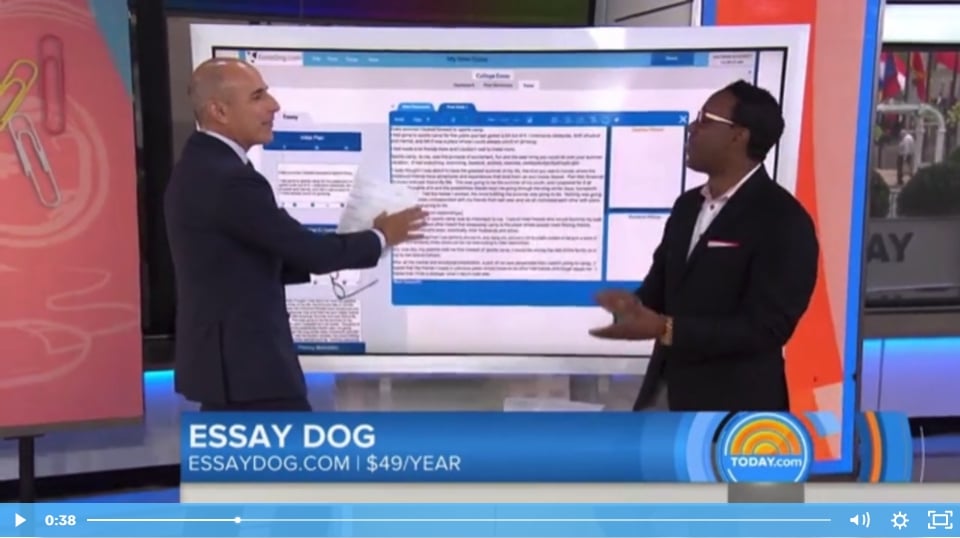
American Express / Cheddar:
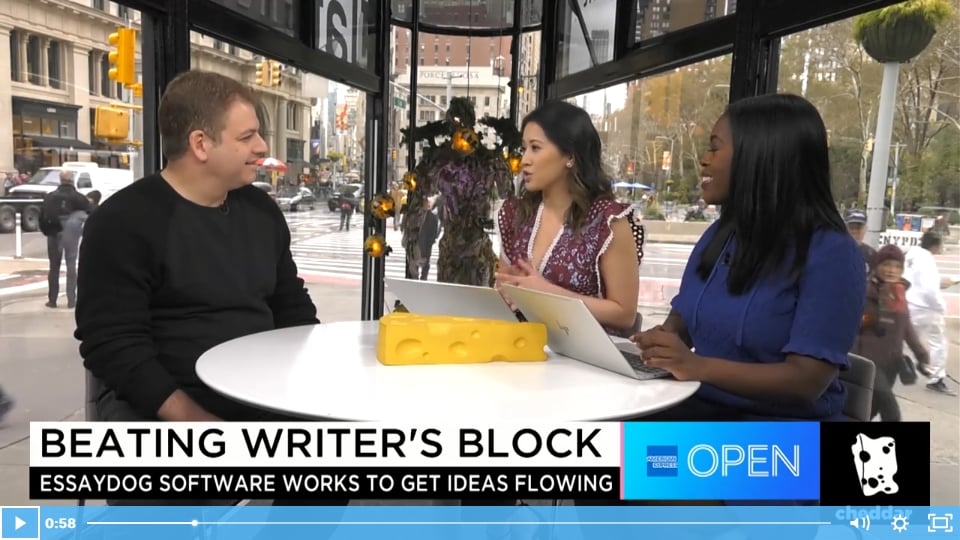
CBS News:

Tech Trends with Art Norman:
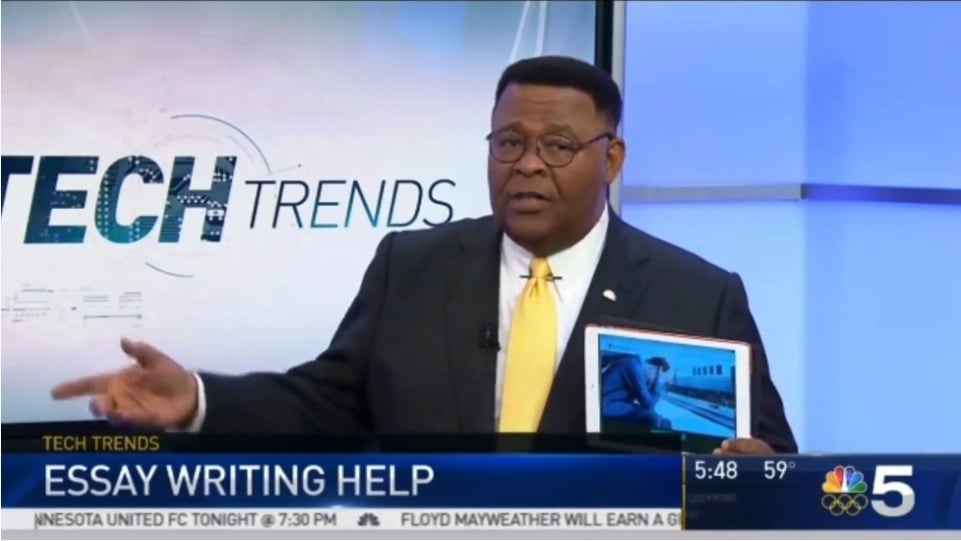
NBC News
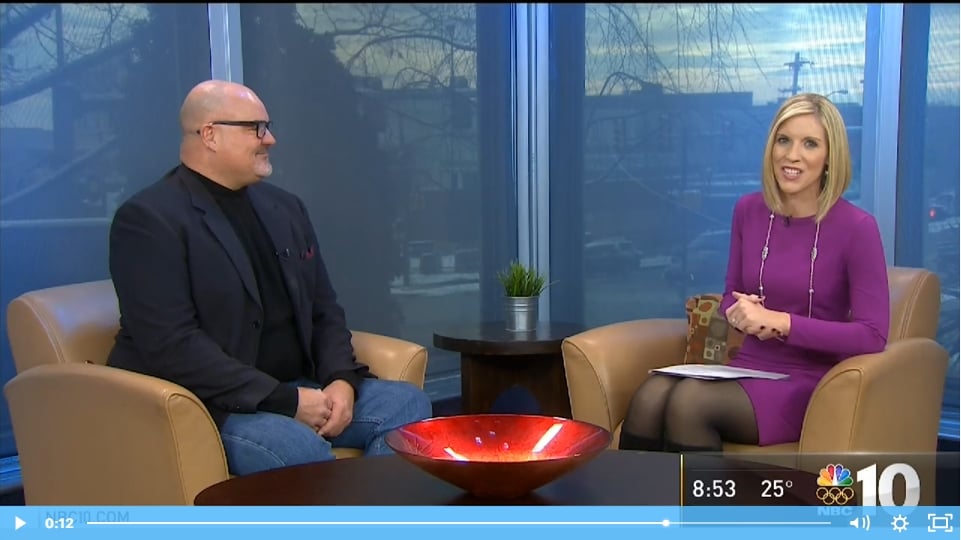
Yahoo Finance:
